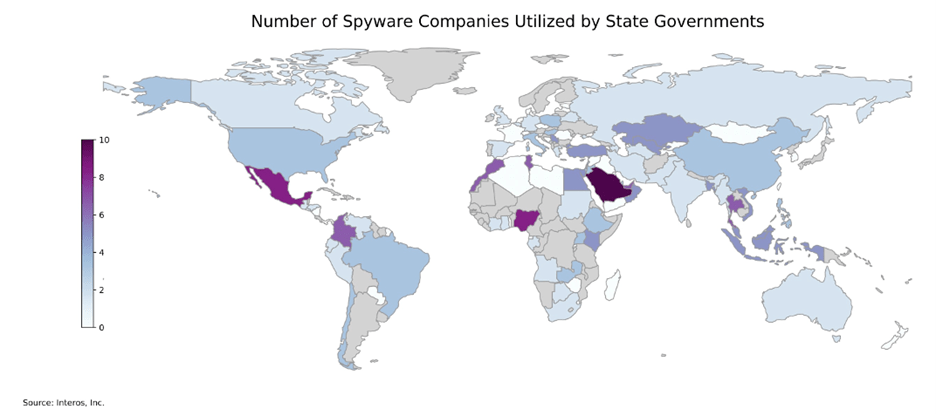
(Source)
Commercial spyware is malware developed by private corporations that effectively repurposes users’ devices into surveillance tools. Once it gains access, commercial spyware can harvest any data on the device and transmit it. This not only includes the device’s stored data but also information collected from remote activation of its cameras and microphones without the user’s permission or knowledge. Governments are simultaneously supportive and wary of this technology as it presents both a national security boon and threat. Currently, U.S. law affords little certainty in protecting private citizens who are victims of commercial spyware. The infamous Pegasus spyware, developed by the NSO Group, is the posterchild of commercial spyware.
What is Pegasus?
Pegasus is capable of covertly infiltrating a variety of smartphone operating systems, including iOS and Android. It can harvest data or collect data through the target phone’s camera, microphone, and apps. Concerning U.S. personnel abroad, Pegasus surveillance previously targeted U.S. embassy staff in Uganda and a high profile U.S. diplomat. Other targets include American journalists, aid workers, and businessmen.
Unlike PRISM, the infamous NSA spying program exposed in 2013 by Edward Snowden, Pegasus surveils more upstream data, closer to the source. In contrast, Prism used backdoor access to the servers of vendors, such as Facebook and Google, scouring stored e-mails, videos, and voice chats.
How does Pegasus work?
Pegasus infects your phone through zero-day and zero-click exploits. A zero-day takes advantage of a yet unknown security flaw. The name comes from the fact that there are zero days to patch the vulnerability before it is used. Zero-clicks are a type of zero-day that does not require any user input to infect the user’s device with malicious software, unlike a typical phishing attack that lures users into clicking on a malicious link.
Software companies offer rewards, known as bug bounties, in exchange for zero-days, which lets them patch the vulnerabilities and keep their products secure. However, both software companies and commercial spyware developers compete against each other for zero-days. And currently, the commercial spyware companies are winning. In other words, the market for zero-days has shifted in favor of commercial spyware developers.
What was the United States government’s response to Pegasus?
In July 2021, a leaked list of prospective Pegasus surveillance targets included American journalists, aid workers, and diplomats. In response, the NSO Group made assurances that the spyware was incapable of targeting American phone numbers within the United States. In December 2021, the U.S. Department of Commerce blacklisted the NSO Group for malicious cyber activities because of Pegasus spyware discovered on the phones of U.S. State Department employees in Uganda. Subsequently, the New York Times revealed that the FBI purchased Pegasus in 2019 and tested it alongside another commercial spyware, one capable of deployment against American phones. In March 2023, President Biden signed an executive order prohibiting the United States government from using commercial spyware that poses a risk to national security. Notably, the U.S. does not rule out the use of commercial spyware against private citizens. In fact, the United States, along with other nations, views commercial spyware as a necessary tool for national security that also represents a potential national security threat.
What are my legal protections?
Currently, cases involving Pegasus in the United States are limited. None have reached a judgment, and no case involves individual United States citizens. After Apple Inc. sought dismissal of its lawsuit against the NSO Group on September 13, 2024, only two cases involving Pegasus remain active in the United States. One case involves WhatsApp, which accuses the NSO Group of exploiting a bug in the messaging app to infect 1,400 devices with Pegasus. Another involves El Faro, an El Salvadoran news organization targeted by Pegasus surveillance.
WhatsApp is arguing its case under the Computer Fraud and Abuse Act of 1986 (CFAA). In 2021, Van Buren v. United States interpreted the CFAA’s idea of unauthorized access as akin to a traditional trespass. Essentially, accessing information via an unauthorized method or in an off-limits area gives rise to criminal and civil liability under the CFAA. If WhatsApp chooses to apply this theory and succeeds, then it is theoretically possible for any victim of a commercial spyware infection to file a claim.
However, significant challenges remain for litigating commercial spyware cases. Foremost, plaintiffs must be able to establish standing by suffering concrete and particularized injury. Secondly, it is unclear if commercial spyware companies are ideal defendants considering that their customers, state governments, are the ones doing the actual spying.
In sum, individual legal protections against commercial spyware remain indefinite: much hinges on the outcome of WhatsApp’s lawsuit and the general applicability of Van Buren’s interpretation of the CFAA. Future litigation will present more answers, but it remains to be seen if the law can keep abreast with the proliferation of sophisticated commercial spyware.
What about the future?
The lack of successful litigation against the usage of commercial spyware means that, for the moment, potential litigation by American citizens must rely on novel legal theories. A win by WhatsApp would potentially give Americans a singular but potent arrow in their quiver.
On the other hand, altering the current status quo of government surveillance requires legislation. In fact, the Government Surveillance Reform Act (GSRA) of 2023 proposes to do just that by closing several surveillance loopholes that enable warrantless searches for Americans’ communications and data. While not yet enacted, the bipartisan bill would bolster and modernize Americans’ privacy rights.
All told, while the availability of definite legal solutions leaves much to be desired, progress means that leaving our phones behind is also no longer our only option.
Suggest Citation: Michael Ahn, How Vulnerable Are We to Commercial Spywares?, Cornell J.L. & Pub. Pol’y, The Issue Spotter (Oct. 24, 2024), http://jlpp.org/how-vulnerable-are-we-to-commercial-spyware/.


